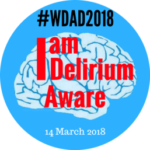NIDUS Blog
Del-COrS Research study seeking input from delirium survivors and family
A study led by Louise Rose, PhD, RN, FAAN, of the University of Toronto Bloomberg Faculty of Nursing, is seeking people who have experienced delirium and their family members to take part in a study. The study is titled “Development of core outcome sets for effectiveness trials of interventions to prevent and/or treat delirium” (Del-COrS) […]
World Delirium Awareness Day (#WDAD2018)
This post was contributed by Heidi Lindroth, PhD Candidate, RN, University of Wisconsin-Madison, School of Medicine and Public Health, Department of Anesthesiology School of Nursing. “…My eyes were open, but what they saw was not real. My delirium was filled with paranoia, fright and joy. In the ICU, I just knew I heard my […]
2017 in Review: Progress toward Delirium Prevention
This post was contributed by Heidi Lindroth, PhD Candidate, RN, University of Wisconsin-Madison, School of Medicine and Public Health, Department of Anesthesiology School of Nursing. Let’s ring in the New Year 2018 with a review of research from 2017 focused on delirium prevention. Often, when I talk to others about the confusion and distress experienced by […]
Featured Article: Using Simulated Family Presence to Reduce Agitation
Family visitation in the hospital can be a huge source of comfort to patients during their stay, particularly elderly patients. Loved ones can bring a sense of familiarity and relief from the stress and fear of being in the hospital. In fact, family visitation may provide more impact than just the comfort it brings patients. […]
Long-term Cognitive Impairment after ICU Delirium: Common but Under-Recognized
Case example Sandra, a 75 year old single female, was found lying on the floor of her home by her long-time neighbor. She was not oriented to who she was, where she lived, or the year. She was brought to the emergency room and found to have a urinary tract infection, sepsis (a blood infection), […]
Challenges and barriers to identifying delirium in stroke patients
Post contributed by A.M. Barrett, Kessler Foundation Bill hasn’t been himself, and his family is very concerned. A retired professor, Bill seemed to do very well after his stroke, and was in good spirits and clearly on the road to recovery during the first two days of his hospitalization on a stroke unit. On the […]
Delirium and Hospital Quality
This post was contributed by Vanja Douglas, MD, and Stephanie Rogers, MD, both of the University of California San Francisco School of Medicine. Delirium is increasingly being recognized as a potential area of hospital quality measurement. In several ways, delirium represents an ideal quality metric because standardization of care in this area is likely to […]
When Confusion is Confusing: Family Caregivers and Delirium among Older Adults
Mary’s 86-year-old mother Eileen has been living with her and her family for the past two years. Eileen is a widow with mild dementia. She is pleasant, communicative, and able to perform simple ADLs. Mary’s husband and her adult children help provide support, while Mary provides most of the caregiving tasks. Last week Eileen […]
Tags
Blog Topics
- Announcements & News (121)
- Delirium Research (82)
- AD/ADRD (10)
- Investigator of the Month & Spotlights (43)
- NIDUS Resources (8)
Citing a published NIDUS blog post on your CV
When citing a NIDUS blog post on your CV, list it in a section entitled ‘Other Non-Peer Reviewed Scholarship’. For the actual citation, list your name, blog title, organization (NIDUS), and the link to Blog. At the end, add ‘invited blog’ in brackets. This is the format suggested on the Harvard Med School CV template.
Example:
Sam Jones, My Delirium Blog Post, NIDUS, www.deliriumnetwork/my-delirium-blog-post.org (invited blog)






